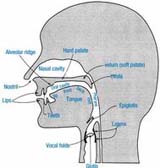2.4.- Pronunciation of the phoneme /ŋ/.
The most important characteristics of this sound are:
- Nasal sound: When you pronounce it the air escapes through the nose.
- Velar sound: The back of the tongue must be against the soft palate.
- Voiced sound: The vocal cords vibrate when you pronounce this sound.
This phoneme can appear:
- In the middle of a word:
ng: finger /ˈfɪŋɡə(r)/, angry /ˈæŋɡri/, longer / lɒŋgə(r)/, singer /ˈsɪŋə(r)/
nk: donkey /ˈdɒŋki/, monkey /ˈmʌŋki/, ankle /ˈæŋk(ə)l/
nc: uncle /ˈʌŋk(ə)l/
As you can see from the examples, the spelling nk, nc is always pronounced with /ŋk/. However the spelling ng, when it is in the middle of a word, can be pronounce with /ŋg/ or simply /ŋ/. The difference lies in the way the words are constructed. For example, the word singer is derived from the word sing and the suffix –er is added. However, the word finger is not derived from any other word. Therefore, words which are derived are pronounced with /ŋ/ unlike words which are not derived from other words.
But, there is an exception to this rule. It is the case of comparatives and superlatives. They do not follow the rule explained above. Although they are derived from another adjective plus the suffix –er/-est, they are always pronounced with /ŋg/ like longer /lɒŋgə(r)/.
- At the end of a word:
ng: long /lɒŋ/, song /sɒŋ/, thing /θɪŋ/, wing /wɪŋ/, wrong /rɒŋ/
nk: think /θɪŋk/, thank /θæŋk/
At the end of a word the spelling ng is always pronounced /ŋ/ and the spelling nk always /ŋk/
